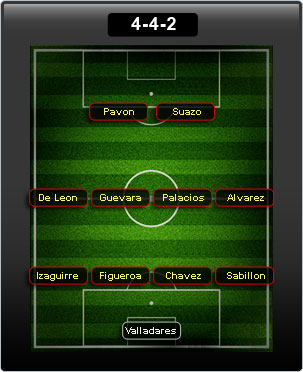
| Diego Alberto Milito | |
| Date of Birth: | Jun 11, 1979 |
| Place of Birth: | Bernal, Buenos Aires |
| Nationality: | Argentina |
| Height: | 179 cm. |
| Weight: | 78 Kg. |
| Position: | Striker |
| Squad Number: | 19 |
| Club Team: | Inter milan |

| Diego Alberto Milito | |
| Date of Birth: | Jun 11, 1979 |
| Place of Birth: | Bernal, Buenos Aires |
| Nationality: | Argentina |
| Height: | 179 cm. |
| Weight: | 78 Kg. |
| Position: | Striker |
| Squad Number: | 19 |
| Club Team: | Inter milan |





Coach: Reinaldo Rueda
Confederation: Concacaf
FIFA Ranking (April 10): 40
Previous Appearances: 1 (1982)
Honduras will participate in its second World Cup. The first one was the 1982 edition in Spain. There are not many achievements for the Bicolor, most notably a third place finish in the 2001 Copa America and a runner up position in the CONACAF Gold Cup in 1991. Honduras have won the Central American Championships twice. This year has been one of the best in Honduras' football history. In addition to World Cup qualification, the Under-17 and Under-20 teams qualified for their respective youth tournaments. The Under-23 team was also present last year in the Beijing Olympics.
How They Qualified
Honduras finished in third place in CONCACAF zone, with 16 points, just bellow USA and Mexico. The Catrachos punched their ticket to the South African jamboree on October 14, 2009, after beating El Salvador 1-0 thanks to a goal from Carlos Pavon. Nevertheless, Honduras need Costa Rica to lose to the USA, and that happened in a dramatic fashion, with United States scoring the winning goal in the 94th minute. That goal allowed Honduras to celebrate their qualification, and sent Costa Rica to the play-off, which they eventually lost.
Strengths
Honduras has a strong defence and a powerful midfield. Its back line conceded less goals than any other in the qualification phase. The counterattack is its main weapon, thanks to the fast players at the front.
Weaknesses
During the whole qualification phase, goalkeeper Noel Valladares was criticised because of his constant mistakes. Honduras is a strong side playing at home but in away matches it lacks audacity. The team also has psychological limitations, due to the lack of international competition at the top level, something that is starting to change with the several Honduran players playing in Europe.
The Coach
Colombian Reinaldo Rueda showed two styles during the World Cup qualifiers. At home, the coach implemented a 4-4-2 tactical formation, with two fast paced forwards. However, when playing away matches, Rueda used a 4-5-1, adding one more defensive midfielder. That defensive tactics were widely criticised by the press.
Star Men
Carlos Pavon (Real Espana, Honduras)
 | The 37-year-old striker is considered a symbol in Honduras football. He is the all-time leading goalscorer for the national team with 55 goals, and also the all-time goalscorer of his team, Real Espana, with 64 goals. This will be his first World Cup. |
David Suazo (Inter)
 | Fast and strong, a typical striker that doesn't need a great technique to be a threat to defenders. The Inter player will finally have the chance to play at the highest level. He is the hope of goals for every Honduran fan. |
Amado Guevara (Toronto FC, Canada)
 | This skilled midfielder is the captain of the Honduran team. Guevara is a player that never misses a match and his presence inspires his team-mates. He is cool in the midfield and has great technique. He is a true born leader. |

Best Footballing Moment
It was at the Copa America 2001 in Colombia. Honduras was invited after USA declined, and the team ended up in third place. But the very best moment was on July 27, when Honduras destroyed Brazil in quarter-finals, with a 2-0 victory thanks to two Saul Martinez goals.
Off The Pitch
Famous for: Honduras is known for its delicious foods. The baleada is the most famous one, which is kind of a flour omelet, with beans, cheese and butter. There are also several nice foods with shellfish.
Most likely to: Players will not miss their traditional food. The Federation will take several chefs to South Africa who will cook typical Honduran food for the team.
World Cup Objective
Despite being its second World Cup adventure, Honduras will not be happy only with participating in the tournament. The players have already said that they want to get at least to the round of 16.




